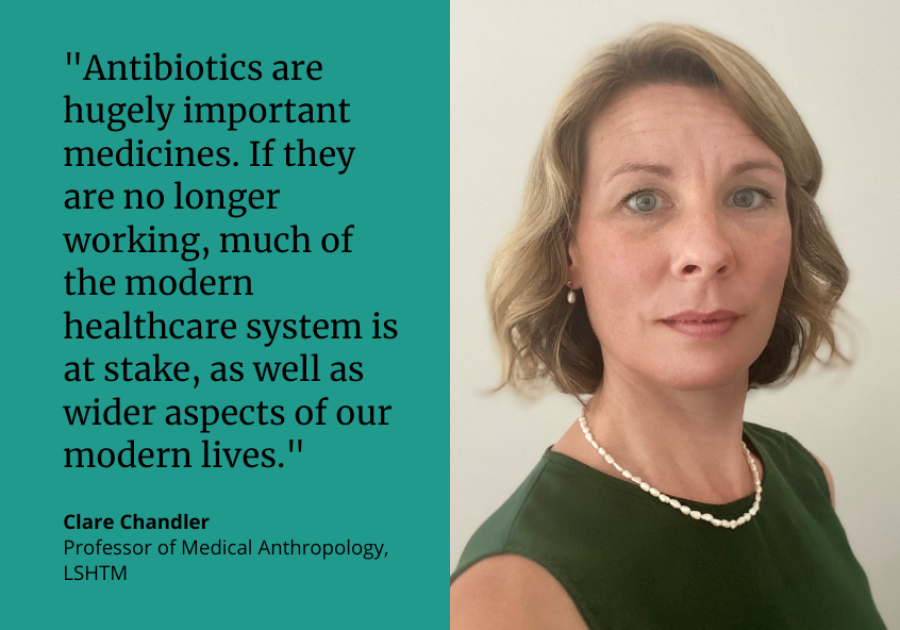
Each year, an estimated 7.7 million deaths are caused by bacterial infections, globally. Out of these deaths, about 1.27 million are attributable to bacteria which have developed resistance to antibiotics.
What is antibiotic resistance and what does it mean for us?
Bacteria are an important part of our lives and bodies but sometimes, we can be infected by bacteria that go on to cause adverse effects. When the body is unable to fight an infection, which can be seen in cases of pneumonia, sepsis or peritonitis, bacteria can also directly lead to death. These serious infections disproportionately affect those who are most vulnerable, such as those who may be undergoing treatment for cancer but with antibiotics, often these deaths are avertable.
Antibiotics started to be mass-produced from the 1950s and due to their success at both fighting and preventing serious infections, they are now widely used. Unfortunately, bacteria are continually evolving to resist these medicines, meaning that infections people might previously have overcome with the use of antibiotics can now be untreatable. As this happens, and as our global demographics change, we will need to keep-up with a changing profile of drug resistance. This means we will need effective antibiotics, improved infection prevention measures and to be better able to manage infections. This applies both to humans and to animals, who also suffer from drug-resistant infections.
Why is this happening and what could be influencing the rise in the burden of resistance?
Bacteria have always evolved to survive better in the presence of substances that may be harmful to them, including antibiotic medicines. However, there are several factors which may be contributing to a rise in the burden of drug resistance.
Although many prescriptions of antibiotics can be vital, they can also be used unnecessarily, for example, for a cold that is likely to be caused by a virus. The antibiotic will not have an effect on the cold and the patient will continue to feel unwell, but it will affect their own community of microbes and those in the wider environment once passed through the body. This creates an opportunity for the bacteria to evolve, without benefit to the person taking the medicine.
We also use these substances to treat infections in our domestic animals like cats and dogs, as well as in livestock and fish farming, which can further add to the pressure on microbial communities to evolve.
How impactful could the misuse of antibiotics be for health systems across the world?
Antibiotics are hugely important medicines that have the power to enable people to survive serious infections. If they are no longer working, much of the modern healthcare system is at stake, as well as wider aspects of our modern lives.
Reducing the overuse of antibiotics should buy us time but resistance to antibiotics does raise a spectre over different components of health systems that rely on these medicines being effective. Examples include neonatal and maternal health, in cancer care and in surgery. Without effective antibiotics, the mortality rates for each of these areas are at risk of escalating.
What changes can we make to reduce the impact of antibiotic resistance?
To reduce the volume of antibiotics interacting with microbial communities, we need to decrease the overall amount of antibiotics we use. We can do this by reducing unnecessary prescribing in humans and animals, and avoiding the use of antibiotics as animal growth promoters.
Bacteria can be transmitted by numerous routes, so it’s important that we take the most appropriate steps to slow down transmission of antibiotic-resistant infections. For example, gonorrhoea bacteria have become resistant to a lot of available antibiotics. We should therefore continue to encourage preventative measures, such as condom use, to prevent catching this sexually-transmitted infection.
Basic hygiene measures such as hand washing, careful food preparation, and the availability of clean drinking water and good sanitation systems, are also vital in preventing the spread of these infections.
Is this one of the greatest concerns for health in modern times?
Drug resistant infections are a great concern. As well as needing to ensure the pipeline of new antibiotics is effective – which is a major challenge – we also need to work on building resilient health systems, robust to the prospect of operating without reliably effective antibiotics.
The burden of drug resistance is also unevenly shouldered, as some communities do not have access to the treatments they need including next-line antibiotics. We must strive towards equal access to medication, high vaccine coverage and improved infrastructure that helps to prevent disease.
Drug resistance is often called a ‘One Health Problem’ because of the way that the journeys of bugs and drugs moves between animals, people and the environment. There are no easy or simple solutions, and scientists are working hard to evaluate different options to avoid the negative trajectory that has been projected in the coming decades. This problem requires serious political attention and commitment to act now, as it’s clear that significant changes are needed to slow the tide of drug resistance and manage it into the future.
By: Clare Chandler, Professor of Medical Anthropology at the London School of Hygiene & Tropical Medicine (LSHTM)
LSHTM's short courses provide opportunities to study specialised topics across a broad range of public and global health fields. From AMR to vaccines, travel medicine to clinical trials, and modelling to malaria, refresh your skills and join one of our short courses today.
